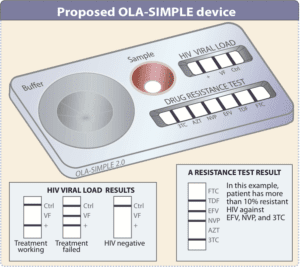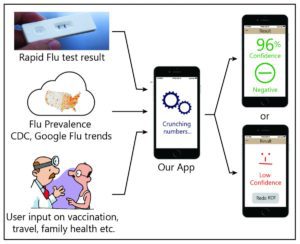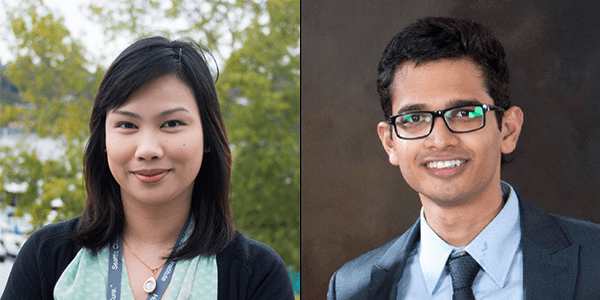Nuttada Panpradist and Rahil Jain, both Ph.D. students in UW Bioengineering Associate Professor Barry Lutz’s lab, are among 10 finalists around the nation for the APF Student Technology Prize for Primary Healthcare. The competition, administered by Massachusetts General Hospital’s Ambulatory Practice of the Future (APF) and sponsored by the Gelfand Family Charitable Trust, encourages and supports engineering students’ efforts to develop innovative, clinically relevant primary health care technology concepts.
As finalists, Nuttada and Rahil will receive $10,000 to advance their projects and prepare a final proposal. Finalists will submit their final proposals in August, from which first place ($150,000), second place ($100,000) and third place ($50,000) winners will be selected. For a list of finalists, see the APF Student Technology Prize website.

Illustration of OLA-SIMPLE device
Fourth year bioengineering Ph.D. student Nuttada’s project addresses the increasing prevalence of HIV resistant to antiretroviral therapy (ART) in low-resource regions, such as in sub-Saharan Africa and Asia. In developed regions, patients are routinely tested for drug resistance following HIV diagnosis. However, this testing is often out of reach in the developing world because it is costly, and requires access to sophisticated laboratory equipment and personnel. Additionally, in these settings, tracking patients to coordinate testing for drug resistance following positive HIV diagnosis can be difficult. These complications often lead to treatment failure and proliferation of drug resistance.
Nuttada is working on a first-of-its-kind, instrument-free, paper-based device that emulates the diagnostic capabilities of laboratory testing and offers a rapid visual readout of HIV diagnosis, viral load, and drug resistance. The device is based upon her previous work to simplify a laboratory-based oligonucleotide ligation assay (OLA) technique, pioneered by her clinical collaborators Dr. Lisa Frenkel and Ingrid Beck of Seattle Children’s Research Institute. The device will integrate innovative biochemistry and microfluidic physics techniques to enable rapid – 60 minutes – testing for HIV infection, viral load and multiple types of drug resistance in a single visit.
Along with Dr. Frenkel, Nuttada’s project team includes Dr. Lutz and Dr. James Lai of UW BioE. Several BioE students are involved in the project, including Nikki Higa, Annie Wong-On-Wing, David McIntyre, Jonathan Lim, Betelhem Yohannas, and alumnus Ian Andrews. As Nuttada’s team moves on to conduct proof-of-concept work and a pilot study, they will work with a field collaborator UW Associate Professor of Global Health Michael Chung in Kenya. The team is planning to work with Inbios International to produce devices for pilot testing.

Diagram showing how Rahil’s app integrates information from flu RDTs, infection trends and personal health factors to show probability of a positive or negative flu diagnosis.
Rahil, a fifth year electrical engineering Ph.D. student, aims to improve performance of existing rapid diagnostic tests (RDTs) for infectious diseases like the flu. RDTs offer ease of use and quick diagnosis in clinical settings, making them an attractive alternative to slower laboratory-based testing. Yet, RDTs currently used in health care settings do not diagnose infectious diseases accurately. Tests used to diagnose flu are particularly notorious; in 2009, the CDC advised that doctors stop using flu RDTs due to their poor performance. Laboratory-based tests offer increased accuracy but they are expensive and resource-intensive. Developing improved RDTs could take years to receive FDA approval and enter the market.
To improve the specificity and sensitivity of commercially available RDTs, Rahil proposes to create a smartphone application that calculates the probability of a positive diagnosis. Using the app, a doctor enters the patient’s risk factors via a simple survey, and enters the patient’s RDT results, either manually by taking a photo for the app to analyze. The app uses an algorithm to analyze current disease trends collected from resources like the CDC and Google Flu Trends, the patient’s risk factors and RDT results, and provide the doctor a positive or negative diagnosis and the statistical confidence of that result.
Rahil’s project collaborators include UW School of Pharmacy Ph.D. student Blythe Adamson. UW faculty collaborators include Dr. Barry Lutz, Dr. Matthew Thompson of UW’s Department of Family Medicine, Dr. Sean Mooney of UW Medicine and clinician Leah Yoke, infectious disease PA-C (Physician Assistant) at UW Medicine and Fred Hutchinson Cancer Research Center.


